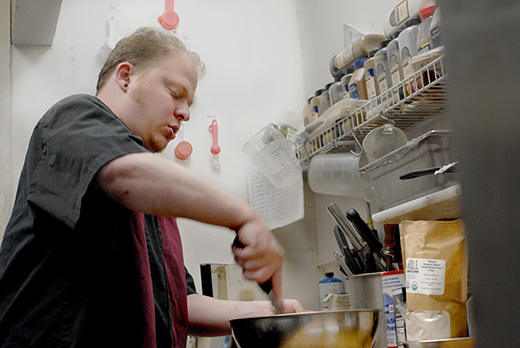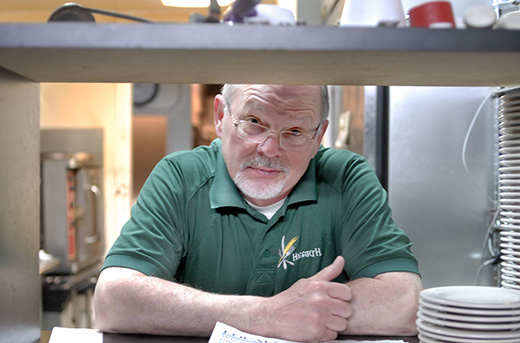
Seth Higgins at Hearth restaurant in Peoria Heights uses flour from The Mill at Janie’s Farm to prepare pie crust. (Photo by Clare Howard)
“This flour is alive,” he said as he removed two bags made with Glenn hard red spring wheat from his walk-in refrigerator. “I’ve fallen in love with this flour.”
Higgins, executive chef and baker at Hearth restaurant in Peoria Heights, said, “Look at the difference” as he filled a measuring cup with commercial flour and placed it on his work station next to one filled with flour from The Mill at Janie’s Farm. The commercial flour was unbleached but looked white and barren. By comparison, the organic flour from Janie’s Farm looked multi-colored with flecks of tan and slight variations in texture.
“I like using this flour. It has a good earthy flavor and a nuttiness,” Higgins said as he mixed ingredients for two piecrusts for his famous bourbon-pecan pie served nightly at the restaurant owned by his father Hugh Higgins.

Hugh Higgins, owner of Hearth restaurant in Peoria Heights, said “Local farms first” when it comes to sourcing his food supplies. He wants the freshest food possible and that includes flour, so supplies from The Mill at Janie’s Farm are an obvious choice. (Photo by Clare Howard)
The two were just recently introduced to this new line of flours that are milled using century-old techniques with organic wheat grown about 100 miles east of Peoria.
Flour from The Mill at Janie’s Farm is filled with the living enzymes of organic wheat. These living flours can be kept in refrigeration for up to six months or frozen for up to a year.
By contrast, producing commercial flour usually starts with wheat grown with chemicals. Shortly before harvest, the wheat is killed with more chemicals. Fumigants are applied while the grain is in storage. Then the grain is milled by removing all oils and adding “enrichments.” End product: dead “enriched” flour.
Right now, Seth Higgins is still experimenting with the flours from Janie’s. In addition to pie crusts and other desserts, he’s made roux, jambalaya, corn bread and a white bread with garlic and rosemary. He expects to try it in sour dough bread.
Several Peoria area restaurants are experimenting with these flours and they are available for home bakers at select stores and online.
Dustin Allen, chef at The Edge restaurant in Peoria Heights, said he works with food supplied by about 60 farmers. His goal is adding to the local economy, supporting family farms and sustainability and serving food with the best flavor. His breads are made without commercial yeast and use starters developed from scratch with flour, salt and water. He called the flours from The Mill at Janie’s Farm “phenomenal.”
“No other industry has this creative freedom,” he said. “I have the ability to tell a story through food.”
Jill Brockman Cummings, manager of the milling operation at Janie’s, said over the past year, two additional people have been hired at the mill to keep up with demand. The mill currently operates five days a week and ships out more than 3,000 pounds each week, but demand could create a weekend shift.
Bakers in Chicago, St. Louis and even Kansas City are ordering flour from Janie’s.
Cummings said one aspect of her job she especially enjoys is educating people about the difference between dead flour and living flour.
One of her favorite questions from customers is “I have not been able to eat bread for years, but I can eat bread made with your flour. Why?”
“I think they know the answer,” she said. “It is the difference between organic grain and commodity grain, between stone milling and commercial milling.”
Flour from The Mill at Janie’s Farm is carried at a number of local grocery stores including Heritage Farm Market in Tremont, Dave’s Supermarket in Fairbury, Common Ground and Green Top in Bloomington, with more stores in the pipeline.
For more information, go to the website: www.themillatjaniesfarm.com.

Recent Comments